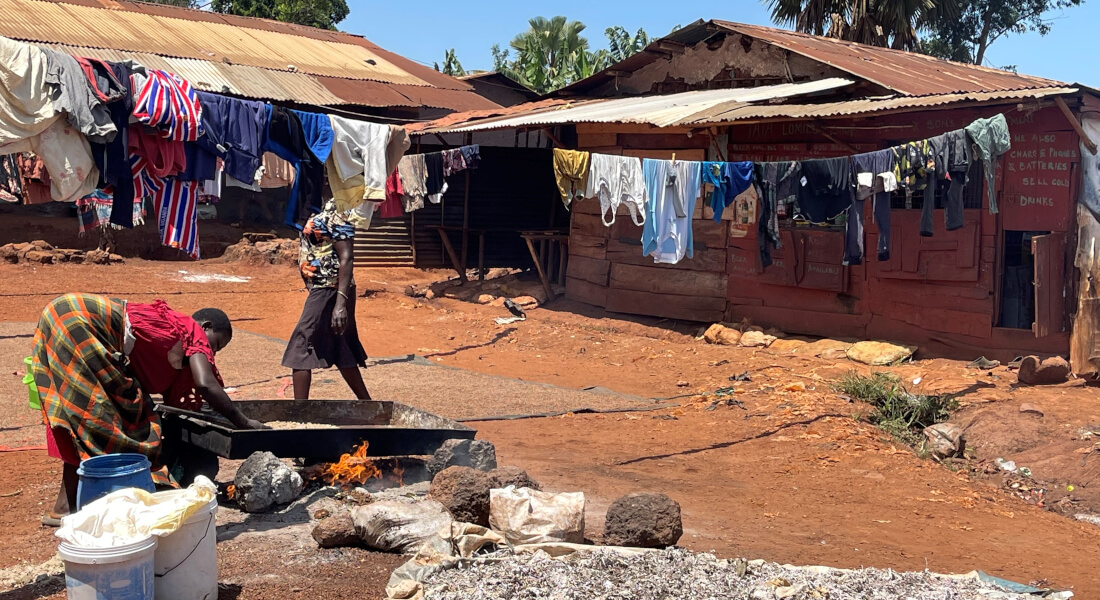Researching Birth Registration Among Karamojong Migrants in Jinja
Paul Morris Musoke, CERTIZENS member and Master’s student from Makerere University in Kampala, is researching factors contributing to the stalling numbers of birth registrations in Uganda. In his fieldwork, Paul focused on the group of Karamojong, an agropastoral people who, triggered by droughts and civil wars, migrated in large numbers to Uganda’s urban spaces. Below, he reflects on how amidst the adaptations to urban life and the preservation of rural traditions, birth registration becomes a contested process.

The Karamojong in Jinja – village life in the city
Jinja Municipality is home to many Karamojong migrants compared to other parts of the district. This influx started over two decades ago. Today, the Karamojong have created a social network that links those in rural areas to the town, paving the way for others to come. The Karamojong migrants in Jinja live in homesteads, mostly in Masese and Shauri Yako villages, closely linked to each other, with a village elder as their head. The communal support for finding accommodation is strong. Most of the people I spoke to did not struggle to find a place to stay or work. Many told me that upon their arrival they were housed either by friends or family members or another Karamojong. Some came in separate groups but told me that they shared houses with fellow Karamojong with whom their leaders in Jinja connected.
In one of the many conversations during my fieldwork, a participant shared her story as to why she decided to migrate:
"I disagreed with my mother-in-law on how to spend money earned from cow sales. She wanted to take the biggest portion for drinking alcohol. When I refused, she started a quarrel and ended up fighting. I decided to leave the home to join my husband who was in town."
Poverty in their previous lives in Karamoja, due to the outcome of the civil war in northern Uganda (1986–2006) between the Lord's Resistance Army (LRA) and the Uganda People's Defense Force (UPDF), had devastating consequences in northern districts of the country. Thousands of civilians were killed or mutilated, and nearly 1 million citizens were displaced into camps that were characterized by “violence”, “appalling conditions”, “poverty”, and “death” which created a state of hopelessness and instability in homes. As such, the people affected resorted to drinking as a way to console themselves. Problematic drinking behaviour in the Karamojong community, connected to depression, asset loss, land conflicts or loss of relatives as a result of wars, as well as cases of domestic violence were narrated to me by several participants. The story above highlights a shared experience of abusive alcohol consumption and the value of preexisting networks when migrating.
However, adapting to the urban way of living is a challenge for many. Economically, the reliance on cash for everyday needs is a particular burden. Birth registration, emphasized by the Ugandan administration as mandatory, is part of this pressure because it requires a monetary payment in the hospital. Many Karamojong parents with small businesses generally prioritize the needs at hand, which leads to low birth registration records within the Karamojong migrant community.
Furthermore, in an interview with the chairman of Masese III, Walukuba, I got to know that cultural norms play a significant role as well, for example concerning giving birth at home or the common practice of traditional marriage without a marriage certificate. Parents, in this case especially the mothers who work hard to sustain their families, do not send their children to school as a cultural norm, according to one of the respondents. One would rather buy cattle back home than pay school fees or even pay for the required materials for school for their child. On the other hand, if a project arises that offers free education for their children and requires a birth certificate to register the child, then a parent will start finding ways to get the birth certificate. However, if the process entails any spending, automatically the parent quits and the child ends up missing the opportunity. There is limited knowledge locally about the use of the birth certificate as an identification document for the children.
Overall, the motivation for why many Karamojong are keen on preserving their traditional customs despite living in urban spaces is the sense of impermanence and hope among some for a return to the way of living before migrating. Mr. Lokawa Matia, one of the community leaders, perpetually calls on his community members to remember:
"This is a foreign land; we are looking for survival. Even if you grow up you must work hard and go back home to Karamoja! We are here temporarily.”
